|
|
|
Sort Order |
|
|
|
Items / Page
|
|
|
|
|
|
|
| Srl | Item |
| 1 |
ID:
120326
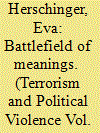

|
|
|
|
|
| Publication |
2013.
|
| Summary/Abstract |
For nearly forty years, debates on a definition of international terrorism as part of a comprehensive convention have been preoccupying the United Nations. This article challenges conventional approaches referring to divergences in national interests and preferences, or to institutional constraints and national legal traditions, to explain why no definition has been agreed upon. It analyzes the inconclusive debates from a critical perspective and argues that the continuous search for a definition can be understood through the prism of collective identity struggles: the desire to define terrorism is not only the desire to give a precise content to terrorism and, thereby, create the identity of an Other. It is also the desire to create a collective identity, a "Self," representing and uniting those who oppose terrorism. By applying a discursive understanding of collective identity construction to analyze the UN debates, the article elucidates how strongly the definition of terrorism hinders a common understanding among those who are opposing terrorism. Thereby, the analysis highlights that the demonization of terrorism foremost impedes a homogeneous understanding of a collective Self, ready to confront and define terrorism in the first place.
|
|
|
|
|
|
|
|
|
|
|
|
|
|
|
|
| 2 |
ID:
099654
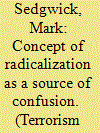

|
|
|
|
|
| Publication |
2010.
|
| Summary/Abstract |
The ubiquity of use of the term "radicalization" suggests a consensus about its meaning, but this article shows through a review of a variety of definitions that no such consensus exists. The article then argues that use of the term is problematic not just for these reasons, but because it is used in three different contexts: the security context, the integration context, and the foreign-policy context. It is argued that each of these contexts has a different agenda, impacted in the case of the integration agenda by the rise of European "neo-nationalism," and so each uses the term "radical" to mean something different. The use of one term to denote at least three different concepts risks serious confusion. The proposed solution is to abandon the attempt to use "radicalization" as an absolute concept.
|
|
|
|
|
|
|
|
|
|
|
|
|
|
|
|
| 3 |
ID:
115185
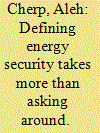

|
|
|
|
|
| Publication |
2012.
|
| Summary/Abstract |
The recent contribution by Benjamin Sovacool proposes 20 dimensions and 320 indicators of energy security in Asia. However, the method for identifying these dimensions and indicators - 64 semi-structured interviews - has three shortcomings. First, Asian policy makers responsible for energy security are absent from the pool of respondents dominated by academics. Second, no prioritization or contextualization of energy security concerns is attempted, leading to an excessively long generic list. Third, no disagreements between the interviewed experts are accounted for. Future attempts to define energy security based on perceptions should involve relevant social actors, include mechanisms for discriminating between primary and secondary concerns and find ways to constructively report on disagreements.
|
|
|
|
|
|
|
|
|
|
|
|
|
|
|
|
| 4 |
ID:
147404
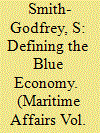

|
|
|
|
|
| Summary/Abstract |
Oceans are increasingly gaining in importance in terms of enabling international trade via linking sellers and buyers. The behaviour patterns of such linking enablers on the oceans are receiving more attention from a regulatory and economic perspective as the relationship between land and ocean evolves in its role and importance. The “Blue Economy” as a concept finds its origin against this background. A literature review is undertaken to analyse an appropriate definition for the Blue Economy. These definitions are analysed in terms of the minimum criteria which are necessary for a Blue Economy. The paper also attempts to structure various types of activities which are associated with ocean services. It is done with a view to identify what one may perceive as the focus areas for the growth of the Blue Economy.
|
|
|
|
|
|
|
|
|
|
|
|
|
|
|
|
| 5 |
ID:
142514
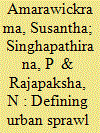

|
|
|
|
|
| Summary/Abstract |
Many scholars agree that there is no clear consensus regarding what “urban sprawl” is or what causes it. The term “sprawl” can be used or defined a number of ways for many situations. When its definition is ambiguous, it is impossible to determine its causes or consequences, including the effects of any policies designed to contain it. In this paper, first, we provide a conceptual definition of urban sprawl based on different dimensions such as density, concentration, proximity to services, automobile dependency, and extent of vegetation cover being paddy, eco-sensitive, or with decreased plantation areas. Such a definition provides a basis for understanding urban sprawl, its nature and its characteristics being location and context specific. Second, an “extended urban area” is demarcated as the geographical base for the study of the urban sprawl. Each dimension is defined and tested in 25 urbanized and suburbanized areas in the Colombo Metropolitan.
|
|
|
|
|
|
|
|
|
|
|
|
|
|
|
|
| 6 |
ID:
085900
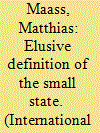

|
|
|
|
|
| Publication |
2009.
|
| Summary/Abstract |
The small state has so far escaped a consensus definition because 'the' small state has in fact been conceived of very differently. Different studies of 'the' small state have characterized it quite distinctly. In fact, there is substantial disagreement even over what type of criteria, quantifiable or qualitative, are most appropriate to characterize the small state. However, I argue that such fundamental disagreement over what makes a state small has actually benefited the area of small states studies by providing it with conceptual flexibility to match different research designs as well as the quite substantial variations among actual small states in the world. In short, in the discipline of international relations as well as in reality, more than one definition of the small state does and should exist.
|
|
|
|
|
|
|
|
|
|
|
|
|
|
|
|
| 7 |
ID:
103925
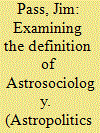

|
|
|
|
|
| Publication |
2011.
|
| Summary/Abstract |
A void has existed within the social sciences for over fifty years since the launch of the first Sputnik satellite in October 1957. This void delineates the boundaries of a missing field, a discipline capable of focusing on the relationship between social life and outer space. It is true that social scientists have pursued space issues over the last thirty years or so. As individuals, they have participated in the areas of search for extraterrestrial intelligence research, astrobiology, space policy, and space history. The strength of astrosociology, however, lies in its formalization of this type of approach into an identifiable field of study, which allows for a more organized and inclusive opportunity for participation. As a starting point, one may express the relationship between social life and outer space as astrosociology. One can define astrosociology as the study of social, cultural, and behavioral patterns related to outer space. The purpose of this article is to provide a general framework for more precise language concerning the definition, scope, character, and future development of astrosociology, while simultaneously attempting to elicit a broader discussion of astrosociology's association to other disciplines. It suggests how the various fields and disciplines associated with astrosociology as a multidisciplinary field can work together to build a missing body of knowledge from their related literatures and contemporary research.
|
|
|
|
|
|
|
|
|
|
|
|
|
|
|
|
| 8 |
ID:
169297
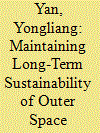

|
|
|
|
|
| Summary/Abstract |
This article provides a summary on the origins of the concept of the long-term sustainability of outer space activities (LTSOSA) by reviewing previous discussions related to the definition of this concept with the conclusion that the LTSOSA is in fact derived from the concept of sustainable development and comprises 5 legal elements, including the principles of intergenerational equity, sustainable use, intragenerational equity, integration, and peaceful purposes. In this regard, the LTSOSA to some extent has been already reflected in international environmental law and international space law. This article, therefore, argues that to enhance the LTSOSA, the Asia-Pacific Space Cooperation Organization (APSCO), which is a regional intergovernmental cooperative organization, has to embrace an LTSOSA regime because of its own interests, the need to fulfill its international obligations that have been imposed by international environmental law and international space law, and the need for regional efforts, which can complement both national and international efforts. Finally, it is concluded that the APSCO should establish internal legal regulations that address issues related to the LTSOSA, at least those that take into consideration space debris mitigation, space weather, space traffic management, capacity building (especially the transfer of space-oriented environmentally sound technology), and radio frequency interference.
|
|
|
|
|
|
|
|
|
|
|
|
|
|
|
|
| 9 |
ID:
153264
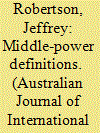

|
|
|
|
|
| Summary/Abstract |
Renewed interest in middle powers since the late 2000s has seen a surge in research. Yet an agreed definition is more elusive than ever. This compromises the ability to pursue meaningful research programs, communicate practical policy advice, and instruct future generations. Why is an agreed definition so elusive and how can this challenge be overcome? The author contends that the definition of the term ‘middle power’ has evolved to be less about discovering either ‘the meaning of a word’ or ‘the nature of a thing’ in the pursuit of knowledge, and more about persuasion, influence, coercion and, ultimately, the exercise of power. An alternative approach to definition offers the best hope to address this challenge. With this objective, the author first looks into the nature and criteria for definition in the social sciences. Second, he looks at the structure of contemporary attempts to redefine the term. Third, he analyses definitional ruptures to shed light on the rhetorical import of contests. Finally, the author turns to rhetorical theory to offer an alternative approach to the definition of the term ‘middle power’.
|
|
|
|
|
|
|
|
|
|
|
|
|
|
|
|
| 10 |
ID:
172201
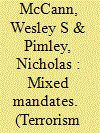

|
|
|
|
|
| Summary/Abstract |
Defining terrorism continues to be a problematic task for scholars, politicians, and government officials. Research has shown that developing a single definition of terrorism is not only unlikely, but also quite difficult. Definitions of terrorism can arguably be influenced by cultural, social, and political factors. This study qualitatively examines state criminal law and federal organizational definitions of terrorism to discern what elements are commonly seen across such definitions. Furthermore, this article examines what issues arise due to the differences and similarities between and across these groups of definitions. This study finds that organizational definitions are seemingly tied to institution mission or mandate, whereas state definitions are sporadic, lacking consensus, and are evidently influenced by major events such as the September 11 attacks. Across organizational and state definitions of terrorism, “violence,” “fear, terror,” and “target” were the most common elements included. However, other definitional elements exhibited different trends when comparing organizational and state definitions of terrorism. Overall, defining terrorism will continue to be a problem in all arenas as long as the definition is allowed to change due to external factors or influences.
|
|
|
|
|
|
|
|
|
|
|
|
|
|
|
|
| 11 |
ID:
074614
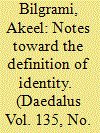

|
|
|
| 12 |
ID:
117492
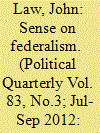

|
|
|
|
|
| Publication |
2012.
|
| Summary/Abstract |
Debate on the relevance (or otherwise) of federalism to the development of the European Union is often characterised by mutual incomprehension on either side. Close inspection, however, reveals that the high temperature of argument may not be solely due to differing visions of the finalite politique. For the precise meaning of the federal concept in political science remains unsettled. This article looks back to the earliest origins of federalism, in order to establish a firm basis for suggesting improvements. The idea of divided sovereignty, 'invented' in America and now thought to lie at the heart of the federal concept, is identified to be a false construction. On these grounds, it is proposed that the definition of federalism be clarified today as not 'a division of sovereignty between two levels of government', but instead 'a division of the powers flowing from sovereignty between two levels of government of equal status'.
|
|
|
|
|
|
|
|
|
|
|
|
|
|
|
|
| 13 |
ID:
075026
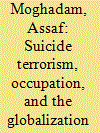

|
|
|
|
|
| Publication |
2006.
|
| Summary/Abstract |
This article offers a three-pronged critique of Robert A. Pape's book Dying to Win. The first section of the article highlights problems related to the book's definition of key concepts, its assessment of existing research on suicide terrorism, and its presentation of data. The next section challenges the book's argument that suicide attacks have a high success rate of 54 percent. The alternative analysis offered here arrives at a significantly lower success rate of 24 percent. The last section argues that Pape exaggerates the link between occupation and suicide terrorism, especially with regard to the case of Al Qaeda. In this context, a distinction between traditional (localized) and contemporary (globalized) patterns of suicide attacks is introduced. It is argued that the occupation thesis may help explain the traditional (localized) pattern of suicide attacks, but falls short of illuminating the causes of the contemporary "globalization of martyrdom."
|
|
|
|
|
|
|
|
|
|
|
|
|
|
|
|
| 14 |
ID:
183008
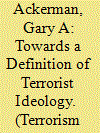

|
|
|
|
|
| Summary/Abstract |
While conventional wisdom holds that the ideology espoused by a terrorist organization is somehow related to that organization’s actions, the precise nature of the relationship between these phenomena is hotly debated, with scholarship often yielding contrasting empirical results. We argue that one reason for this divergence in viewpoints and research findings is an inadequate understanding of what ideology actually is and how it relates to terrorism. Indeed, the terrorism literature reveals widely disparate uses of the concept of terrorist ideology. This article endeavors to provide a common framework for approaching ideology in the context of terrorism studies by systematically building a new definition of terrorist ideology from first principles. In so doing, we introduce a definition of terrorist ideology that is logically consistent, has robust theoretical underpinnings, and connects the study of ideology within terrorism to broader disciplinary research traditions regarding ideology. This provides a conceptual foundation from which to examine terrorist ideology in an objective, systematic manner and thereby enables terrorism researchers to more productively investigate important outstanding questions, such as which aspects of an ideology are most relevant to violent behavior.
|
|
|
|
|
|
|
|
|
|
|
|
|
|
|
|
| 15 |
ID:
072988
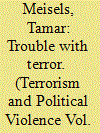

|
|
|
|
|
| Publication |
2006.
|
| Summary/Abstract |
This essay warns against a recent philosophical confusion concerning the definition of "terrorism," which has dominated the post 9/11 literature. Terrorism, it is suggested, is nothing but the intentional random murder of defenseless non-combatants, with the intent of instilling fear of mortal danger amidst a civilian population as a strategy designed to advance political ends. Furthermore, this essay argues that regardless of its "root cause," terrorism is diametrically opposed to the requirements of liberal morality and can only be defended at the expense of relinquishing the most basic of liberal commitments.
|
|
|
|
|
|
|
|
|
|
|
|
|
|
|
|
| 16 |
ID:
140866
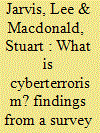

|
|
|
|
|
| Summary/Abstract |
This article reports on a recent survey designed to capture understandings of cyberterrorism across the global research community. Specifically, it explores competing views, and the importance thereof, amongst 118 respondents on three definitional issues: (a) the need for a specific definition of cyberterrorism for either policymakers or researchers; (b) the core characteristics or constituent parts of this concept; and (c) the value of applying the term “cyberterrorism” to a range of actual or potential scenarios. The article concludes by arguing that while a majority of researchers believe a specific definition of cyberterrorism is necessary for academics and policymakers, disagreement around what this might look like has additional potential to stimulate a rethinking of terrorism more widely.
|
|
|
|
|
|
|
|
|
|
|
|
|
|
|
|
|
|
|
|
|